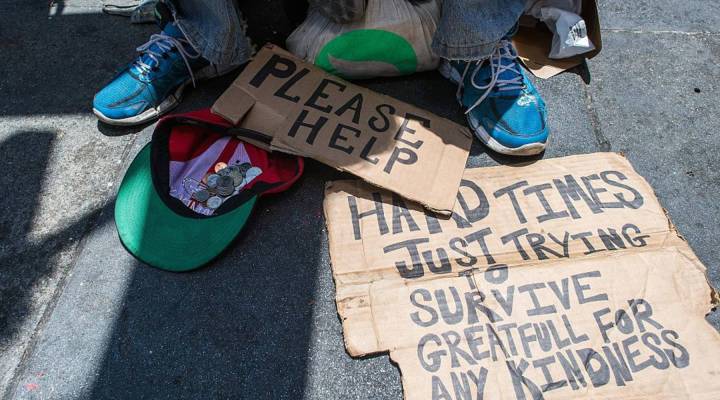
Should Big Tech pay more to help the homeless in San Francisco?
Should Big Tech pay more to help the homeless in San Francisco?

In San Francisco next week, voters will decide whether the city’s largest companies, most of them tech firms, should pay a tax that will raise money to help homeless families. Other cities have tried similar efforts. Seattle’s city council, bowing to pressure from Amazon, recently overturned a tax on large employers that would have funded affordable housing efforts.
But in San Francisco, the leader of the city’s biggest tech employer is backing a similar measure. Molly Wood talked with Marc Benioff, the co-CEO of Salesforce (and yes, the guy who just bought Time Magazine). He’s stumping for the ballot measure called Proposition C. He said Salesforce recently held its annual Dreamforce conference downtown, and attendees from all over the world were horrified at the city’s homelessness crisis. The following is an edited transcript of their conversation.
Marc Benioff: I could tell you how many phone calls and e-mails and stories I’ve had from people who had adverse interactions with [people who are] homeless, terrible situations with the cleanliness of our streets, including encountering human feces and other terrible things. And you just have to ask yourself, “What has happened to our great city here?” And that’s why I’m supporting Proposition C.
Molly Wood: You know, in some way, a business tax in San Francisco is really a tax on the tech industry, which has come under fire for all kinds of problems, including the housing crisis and economic inequality. Do you think that’s fair? Should this industry shoulder the blame for the homelessness crisis and other social problems in San Francisco or anywhere else?
Benioff: Well, I think, you know, Salesforce is the city’s largest employer. And we are also the largest tech company in San Francisco. We’re doing just fine. Our company is worth about $100 billion. Other companies here, add them all up, it’s hundreds of billions of dollars. And all of this wealth has been built on the back of our city. And the question is: Are you giving back to the city now?
Wood: In a New York Times op-ed, you argued that business has to have a purpose beyond profits, and that that can be good for business, too. The counter argument that you quoted was Milton Friedman saying that companies which get in on social issues can undermine the basis of a free society. Considering that we’ve seen a lot of CEOs across tech and other industries get more involved in policy — and CEOs like you and Jeff Bezos and Mark Zuckerberg increasingly control methods of communication in the media — can you see an argument for Friedman’s side, the idea of undermining the basis of a free society? Or unintended consequences, at a minimum?
Benioff: Today I can tell you that, especially here in San Francisco, you cannot separate business from our city. You can’t tell me that this homeless problem is not my problem as the city’s largest employer. It’s my employees who don’t feel safe going to our transit station. It’s our customers who don’t feel safe coming to our conferences. So is this homeless situation somehow separate from my business? No. The business of business is about the whole world.
And now for the other tech news Molly is following:
Some 200 Google employees plan to walk out of work today to protest how the company has handled sexual misconduct allegations. A report in the New York Times earlier this week said Google had paid Android creator Andy Rubin $90 million to leave the company, even though an employee had accused him of sexual misconduct. And after that came out, the company put out a memo and said it had fired 48 people for sexual harassment in just two years. Another one happened yesterday. A director at Google X is out. He was named in that Times story about inappropriate behavior. None of those 48 people got paid for leaving.
And then Tuesday in Quartz the head of Google X gave a long interview about how he thinks gender equality is “the single biggest fixable problem humanity has.” And he said men need to listen and change. So that’s nice.
Check out the latest episode of “Why’d You Push That Button” from The Verge, which is about my favorite topic: group chats. Because you know I think they’re the future of social networking, and I think Apple needs to release iMessage for everyone and be an actual Facebook competitor. The podcast has the director of product management for Facebook Messenger. And, as it turns out, Mark Zuckerberg said during Facebook’s financial results call Tuesday that the News Feed will be less important and ephemeral Stories, Messenger and WhatsApp will be more important. So the vision Facebook has pushed on us for 10 years, a huge commons full of people you barely know and disagree with, actually makes us feel bad about ourselves and gets boring really fast when all we really want is a nice safe place to talk to each other and be friends.
Correction (Nov. 2, 2018): The original version of this story misstated how Seattle’s “head tax” was revoked. The text has been corrected.
There’s a lot happening in the world. Through it all, Marketplace is here for you.
You rely on Marketplace to break down the world’s events and tell you how it affects you in a fact-based, approachable way. We rely on your financial support to keep making that possible.
Your donation today powers the independent journalism that you rely on. For just $5/month, you can help sustain Marketplace so we can keep reporting on the things that matter to you.












